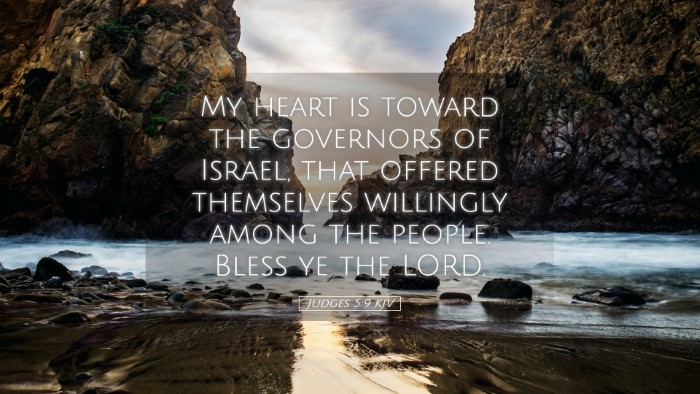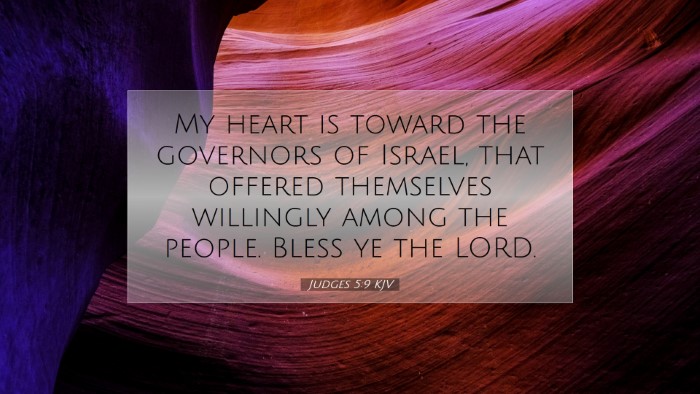Commentary on Judges 5:9
Judges 5:9 states: "My heart is towards the governors of Israel, that offered themselves willingly among the people. Bless ye the Lord." This verse is part of the song of Deborah, celebrating Israel’s victory over Sisera, the commander of Jabin's army. It is a profound reflection on leadership, devotion, and community in the face of adversity.
The verse highlights a component of effective leadership prevalent in Israel during a time of chaos: willingness. The leaders of Israel, particularly those who willingly offered themselves, serve as models of good governance and devotion to the people they serve. The reflections of various commentators provide depth to our understanding of this verse.
Insights from Commentators
Matthew Henry's Commentary
Matthew Henry emphasizes the significance of the leaders’ willingness to serve. He notes that true leaders do not seek power for its own sake but are called to lead in times of need. He observes,
"Those who offered themselves willingly were inspired by the Spirit of God, as was Deborah herself." This highlights that divine empowerment is crucial for effective leadership. Henry further notes that the readiness of the leaders to stand up in battle contrasts starkly with the cowardice shown by others.
Albert Barnes' Commentary
Albert Barnes elaborates on the phrase "my heart is towards the governors of Israel," interpreting this as a deep commendation from Deborah, reflecting her gratitude for their bravery. Barnes points out that, "Their willingness to stand against oppression is worthy of reflection," indicating that leadership has its roots in sacrifice and devotion. Moreover, he suggests that this willingness also entails taking risks and standing firm in faith, serving as a model for contemporary leaders.
Adam Clarke's Commentary
Adam Clarke delves into the emotional aspect of this verse, stressing the significance of Deborah’s heart being towards the leaders. He writes, "Deborah's affections are bound to those who risk themselves for the welfare of the nation." Clarke emphasizes that this emotional connection indicates a mutual bond built on trust and shared purpose. The leaders are not just figures of authority; they embody the hope and determination of the people they represent.
Thematic Reflections
Collectively, these commentaries highlight several themes essential for understanding Judges 5:9.
-
Willingness in Leadership:
The theme of willingness as foundational to leadership emerges prominently. Leaders in the biblical context are called to serve selflessly and with bravery. Willingness implies a readiness to act, to put oneself in danger for the greater good.
-
Divine Empowerment:
The necessity of divine guidance in leadership decisions is underscored. The song of Deborah presents the idea that it is by the Spirit of God that leaders are emboldened to rise and fight for justice.
-
Community and Collective Responsibility:
Deborah’s song is not just a personal reflection; it emphasizes the role of the community in raising up leaders. The people of Israel, through their collective support of their governors, demonstrate the importance of unity in the face of oppression.
Practical Applications for Modern Readers
The insights drawn from Judges 5:9 and the surrounding commentaries offer practical applications for contemporary Christians, pastors, and scholars:
-
Encouragement for Leaders:
Modern leaders can find inspiration in the example set by the governors of Israel. Their selfless service can motivate leaders today to be courageous and committed to their communities.
-
Promoting Willingness in Congregations:
Pastors can encourage congregants to adopt a willing spirit in their service to the church and community. This application emphasizes teamwork and collective action.
-
Recognition of Divine Assistance:
The importance of seeking God’s guidance in leadership decisions is timeless. Modern leaders must be mindful that their wisdom and strength are sustained through a relationship with God.
Conclusion
Judges 5:9 serves as a poignant reminder of the qualities that characterize effective leadership in times of crisis. Through the reflections of noted biblical commentators, we glean insights that are applicable to spiritual and secular leadership today. The heart of Deborah, expressed in this verse, resonates with the understanding that willingness, divine empowerment, and community support are essential for triumph over adversity. As pastors, scholars, and students of the Bible engage with this verse, may they be inspired to cultivate these qualities in their lives and in the communities they serve.


